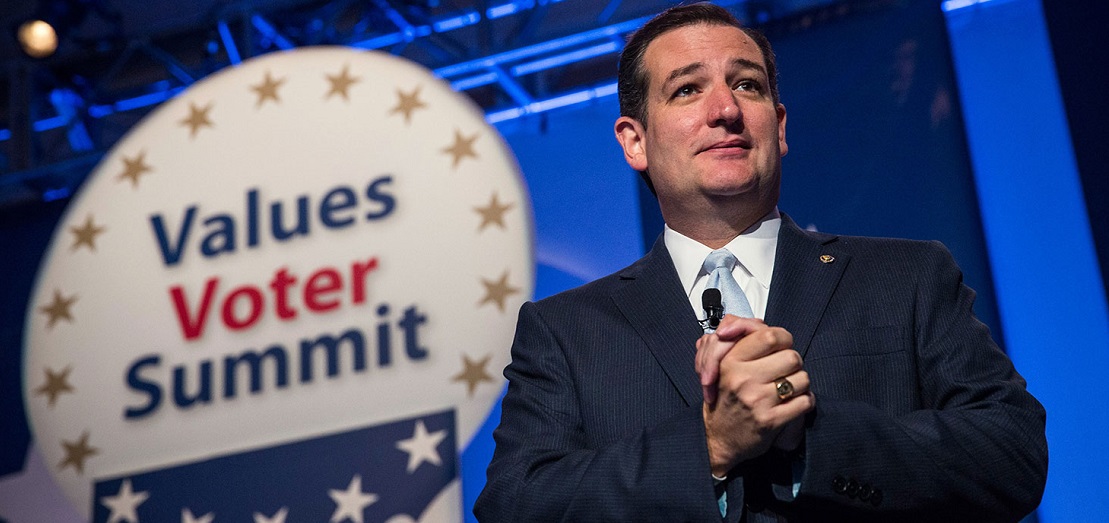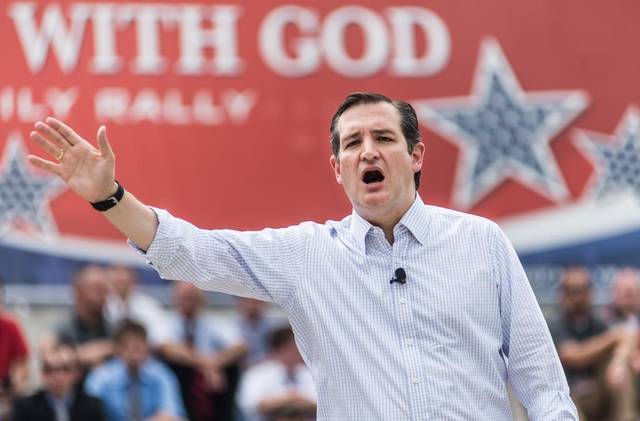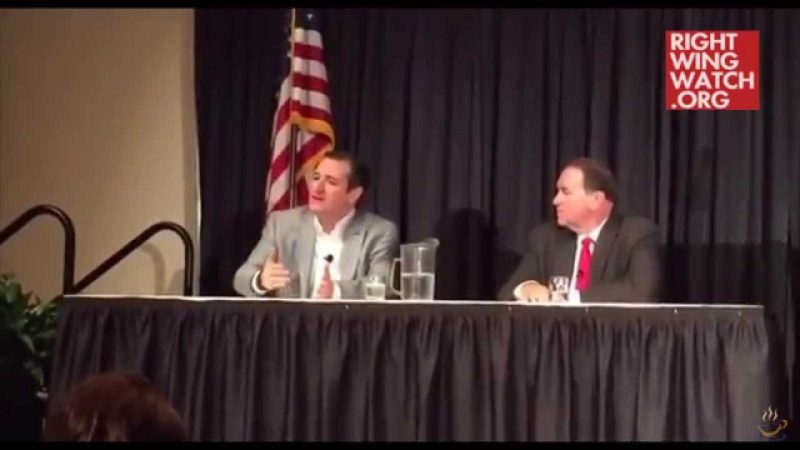So much for the much–expected death of the Religious Right.
Last night, Ted Cruz came out on top of the Iowa caucuses by building a base of conservative evangelical supporters.
According to CNN, about 64 percent of caucus-goers identified as “born-again or evangelical Christians,” up from 57 percent in 2012. Evangelical Republicans put Cruz over the top: He won 28 percent of the vote overall, but was at 34 percent among evangelicals. Cruz came in third among non-evangelical voters, behind Donald Trump and Marco Rubio.
Throughout the presidential race, Cruz has been painting himself as not just the candidate of conservative Republicans and Tea Party members, but the candidate of Christians — or, at least, the Christians who share his particular brand of theology and politics. Cruz’s father and top campaign surrogate, Rafael Cruz, has said that his son has a divine anointing and likened him to Jesus, claiming that his campaign is all about sharing “the love of Jesus Christ” with “every person in America.” Glenn Beck, for his part, hailed the Texas senator as God’s answer to his prayers. To be successful, Cruz said, “we have to awaken and energize the Body of Christ.”
“Sorry, Ted, but an awakened and energized Body of Christ serves the Kingdom of God, not your political agenda,” Christian author Rachel Held Evans wrote in response to the senator’s bold claim.
Cruz and his father may portray his candidacy as a divine mission, but for the Religious Right, doing God’s will requires not just sufficient piety but the political power to get things done.
Sensing a chance to drive the GOP even further to the right, and to put the power of the White House behind their political agenda, the movement’s leadership has almost entirely rallied behind Cruz. And with good reason — he has vowed to implement their agenda with promises to defy the Supreme Court on gay marriage, consider engaging in anti-gay civil disobedience, sign sweeping anti-abortion legislation, go after Planned Parenthood, appoint ultraconservative justices to the bench and block threats to religious liberty of Christians, which he says are rampant in America. For good measure, he announced his candidacy at Liberty University, the institution founded by evangelical firebrand and conservative powerbroker Jerry Falwell.
Cruz assiduously courted both Iowa-based and national Religious Right leaders. In Iowa, Rep. Steve King, far-right radio host Steve Deace and activist Bob Vander Plaats, who helped steer Mike Huckabee and Rick Santorum to victory in the state in 2008 and 2012, respectively, all endorsed Cruz. He ended his Iowa campaign by stumping with the trio along with national figures including radio personality Glenn Beck, anti-gay hate group leader Tony Perkins, Focus on the Family founder James Dobson, Duck Dynasty star Phil Robertson, former Texas Gov. Rick Perry and Rep. Louie Gohmert of Texas.
Trump, in an effort to keep up, trotted out his own evangelical endorsements, including former Gov. Sarah Palin and Liberty University president Jerry Falwell Jr., and launched a bizarre attack on Cruz’s faith, claiming that “not a lot of evangelicals come out of Cuba.”
But there has been little question that Cruz is the Religious Right’s candidate.
Cruz is betting that stature in the Religious Right will help him drive up evangelical turnout in the upcoming South Carolina primary and on Super Tuesday, colloquially known as the “SEC primary” because it is dominated by Southern states. He has insisted that winning evangelical support in the Republican primary will translate into success in the general election, claiming that Republican nominees have lost the last two contests because the party’s insufficiently conservative nominees failed to motivate the Religious Right base.
To inspire that base, the Texas senator is spouting toxic rhetoric about his ideological opponents and hyping purported threats to the religious liberty of American Christians, all while courting endorsements from the Religious Right’s most extreme wing.
At times, Cruz lifts his apocalyptic rhetoric about impending dangers to freedom straight from his most extreme supporters. Cruz borrowed Deace’s line about a gay-led “jihad” threatening religious liberty on the stump and has pushed bogus persecution stories concocted by Religious Right groups about Christians coming under assault.
Last Fall, Cruz appeared in Iowa alongside a pastor who has called for the government to use the death penalty to punish homosexuality. Days before the caucuses commenced, Cruz campaigned with Perkins, the head of an anti-LGBT hate group who helped coalesce Religious Right support behind his candidacy, and Robertson, the reality TV star who told Cruz supporters that they must “rid the earth” of gay marriage advocates because they are ushering in “evil” and “depravity.” Robertson said that voters should pick Cruz because he “loves James Madison,” before sharing a quote on the biblical origins of U.S. government that is falsely attributed to Madison.
When Cruz faced criticism from opponents like Huckabee who said that Cruz and his supporters weren’t serious about outlawing abortion, the senator’s campaign unveiled a “pro-life coalition” co-chaired by a radical activist who believes a just government would execute abortion providers .
What’s good for Cruz is bad for our increasingly diverse country. When Cruz portrays himself as the candidate of “the body of Christ” and claims God’s blessing — and embraces the most extreme wing of his party as he’s doing it — he signals not to just non-Christians but to Christians that don’t share his particular worldview that he’s not interested in working for them. But that is the very reason why Cruz is the candidate who the Religious Right has desperately been seeking: someone who will give them his undivided attention in a country where they are terrified of losing relevance.








